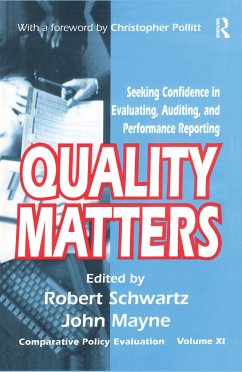Information--regular, systematic, reliable--is the life-blood of democracy and the fuel of effective management. Surely today there is no problem with information, for this is the age of information overload. It pours onto our computer screens and out of our printers. Indeed, many governments claim, often with some justification, to be more open and transparent than ever before. But what if the life-blood is contaminated, or the fuel polluted? Then the body politic sickens and the engine of public management runs rough. It is the vital issue of the quality of the information we receive that this book addresses. Quality Matters compares approaches across different jurisdictional settings and across three different types of information evaluation. The chapters describe and analyze quality assurance in a number of countries and within a variety of international organizations. These have been selected either because they are widely considered to be leaders in evaluating information or because they have experience with assuring quality information that can instruct others. Contributors are from Australia, Canada, the European Union, France, the Netherlands, New Zealand, Sweden, Switzerland, United Kingdom, United States, and the World Bank. This pioneering study analyzes practices for assuring the quality of evaluation, performance auditing, and reporting in the face of political, organizational, and technical obstacles. A final chapter addresses the extent to which quality assurance systems become bothersome rituals or remain meaningful mechanisms to ensure quality control. This well-structured volume will be of particular interest to policymakers and adds much to the literature on program evaluation and performance auditing.
Hinweis: Dieser Artikel kann nur an eine deutsche Lieferadresse ausgeliefert werden.
Hinweis: Dieser Artikel kann nur an eine deutsche Lieferadresse ausgeliefert werden.








